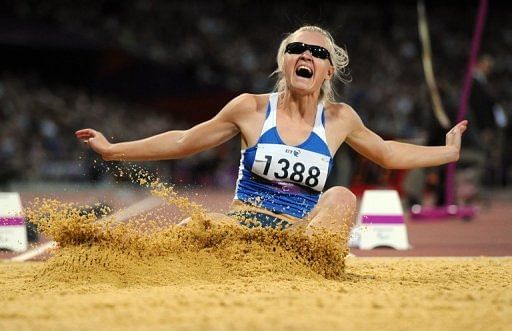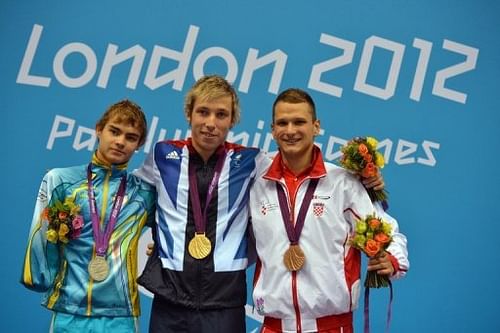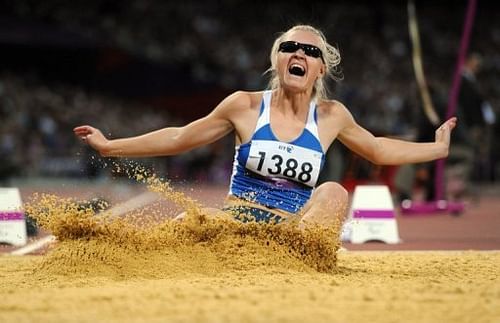
Ukraine's athletes successful at Paralympics despite struggles at home
KIEV (AFP) –

Ukraine’s silver medallist Yevheniy Bohodayko (left) poses with other winners during the victory ceremony for the men’s 100m backstroke at the London 2012 Paralympic Games in August. Ukraine’s stunning success at the Paralympic Games came despite rather than because of attitudes at home, where people with disabilities face huge struggles, the head of its Paralympic Committee told AFP.
Ukraine’s stunning success at the London Paralympics came despite rather than because of attitudes at home, where people with disabilities face huge struggles in daily life, the head of its Paralympic Committee told AFP.
Ukraine took the 44th place in the Games medal table at their first ever Games in Atlanta in 1996, have shown extraordinary progress and this year finished fourth, with an overall yield of 84 medals, including 32 golds.
Such success prompted questions about the secret of Ukraine’s success: had attitudes changed towards people with disabilities, who traditionally experience severe hardship in everyday life in ex-Soviet states?
But the chief of Ukraine’s Paralympic Committee, Valeriy Sushkevych, said the achievement was the result of the team’s individual efforts to overcame personal difficulties.
“Unfortunately I have to state the fact that all of our achievements come not due to but despite the existing situation,” Sushkevych, 58, himself a wheelchair user who performed in the past as a swimmer, said in an interview.
“I’m amazed that despite being almost completely isolated from the normal life of Ukraine’s average population, the disabled here have managed to solve an extremely difficult task — to establish themselves in this life.”

Ukraine’s Iulia Korunchak competes in the women’s long jump F13 final at the London 2012 Paralympic Games in September. Ukraine’s stunning success at the Paralympic Games came despite rather than because of attitudes at home, where people with disabilities face huge struggles in daily life, the head of its Paralympic Committee told AFP.
Sushkevych pointed to examples such as silver-medal winning wheelchair fencer Anton Datsko, who has to take a suburban train 50 kilometres (30 miles) and then a bus to get to training every day.
Even Ukraine’s best-known Paralympian — the swimmer Natalia Prologayeva, who won three golds and one silver in London — has to live far from her husband and children in a hostel in order to train.
Many in Ukraine see the personal dynamism of Sushkevych as the main reason for the country’s success. A lawmaker, he has been involved in sports politics since the 1990s.
Now he wants to take the campaign from the swimming pool and athletics track to parliament.
“For me personally, solving the problems of all Ukraine’s disabled, not only athletes, is a matter of top priority,” he added. “That’s why the mission of battling against the lack of awareness of our bureaucrats is my everyday work.”
Sushkevych said that his committee was concerned with taking care of national Paralympic team members, trying to solve not only the problems of preparations for competitions but also their daily concerns.
“We assign funding for our athletes’ treatment, prosthetics and surgery in case of necessity. We also take care of their aged parents. We are also solving their educational and pension provision problems,” he said.
“But still there’re problems that we are unable to solve by ourselves. And the main problem is housing.
“As a member of parliament I’ve repeatedly discussed this problem with our prime minister (Mykola Azarov) and the governors but to no avail so far.”
Sushkevych said he hoped Ukrainian success in London will change the lives of the disabled by helping push new legislation through parliament.
“The miracles and the greatness of the spirit shown by our Paralympic athletes were inspiring. After their sporting success, I expect their next victory in Ukraine at the legislative level,” he said.
“I believe the Paralympians’ success will become the driving force that will help the parliament to pass further laws in the interests of disabled people of Ukraine, who all need to be treated as equal by our society.”
Ukraine’s Paralympians already enjoy a training base in Yevpatoria on the Black Sea while a winter sports training base has been constructed 1,000 metres (3,280 feet) high in the Carpathian mountains for winter para-athletes.
But while infrastructure such as high kerbstones and a lack of disabled-access ramps or lifts in buildings can be changed and training facilities built, more needs to be done change attitudes, Sushkevych saisd.
“Unfortunately, discrimination of disabled people in the post-Soviet countries is a broad problem. And what is even more lamentable is that it has become commonplace,” he added.